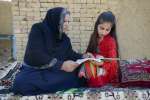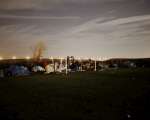UN High Commissioner calls for renewed international focus on Afghanistan
News Stories, 6 October 2015
GENEVA, Oct 6 (UNHCR) – UN High Commissioner for Refugees António Guterres today appealed to the international community to refocus its attention on Afghanistan, warning that it would be dangerous to ignore the country, and praised Iran and Pakistan for hosting so many Afghan refugees.
Stressing Afghanistan was no longer "getting the attention it deserves", he told UNHCR's high-level Executive Committee meeting on the Afghan refugee situation: "We believe that to ignore Afghanistan would be a dangerous mistake, regardless of the urgency and scale of other, newer crises."
At a well-attended gathering on how to create the conditions necessary for Afghan refugees to go home and reintegrate to regions where security allows, Guterres highlighted what he called UNHCR's long-running special relationship with Afghanistan and its two neighbours, Iran and Pakistan, which together have provided a home to 95 per cent of Afghan refugees.
"Reaching over 6 million people at its peak, this is the biggest refugee situation UNHCR has ever dealt with, as well as the biggest voluntary repatriation operation in our history, with over 5.8 million returnees since 2002," he stressed, adding: "Today, after more than 35 years and with 2.6 million registered refugees remaining in 70 countries, Afghans are also the world's largest protracted refugee population."
In a pre-recorded video message to the meeting, President Ghani thanked UNHCR for the decades of engagement with Afghan refugees and thanked Pakistan and Iran for opening their borders and still hosting millions of Afghan refugees.
"My duty calls (me) to prevent the production of more displaced people and refugees. I hope our efforts here will contribute significantly (to that end)," he said.
But President Ghani echoed the High Commissioner's own concern over possible international neglect. "The problem of refugees is a global one. They cannot be placed on an island and forgotten," he said.
Guterres said that – although the situation in Afghanistan "remained very challenging, as recent events in Kunduz have shown" – the new Afghan National Unity Government of President Ghani had committed to making durable solutions for refugees and displaced persons a top national priority.
"This historic commitment, along with Afghanistan's strengthened regional cooperation with the Islamic Republics of Iran and Pakistan, offers an important opportunity to make advances in securing durable solutions for the remaining Afghans," Guterres declared.
In an indication of the international community's commitment towards seeking lasting solutions for millions of Afghan refugees and ending one of the longest displacement situations in history, the Geneva meeting was attended by some 800 participants, representing 131 member states, several UN and international organizations as well as NGOs.
The meeting was also attended by the Minister for Refugees and Repatriation of the Islamic Republic of Afghanistan, the Minister of Interior of the Islamic Republic of Iran, and the Minister for States and Frontier Regions of the Islamic Republic of Pakistan.
A number of guests from key donor states, UN and NGO partners, as well as Afghan civil society also voiced support for efforts to find durable solutions for the many Afghans still in exile.
Guterres stressed, that advances in finding durable solutions would only be possible if the international community provided "significantly more support" to these efforts than has so far been the case.
"Most notably, the regional Solutions Strategy for Afghan Refugees, developed by the governments of the Islamic Republics of Afghanistan, Iran and Pakistan with UNHCR, is the main vehicle for furthering these efforts and needs to be supported more decisively, in particular by development actors," he added.
Guterres pointed out that the number of internally displaced persons now stood at nearly one million and that Afghans continued to leave the country to file new asylum applications elsewhere.
Nevertheless, he emphasized that nearly 54,000 refugees had returned to Afghanistan in 2015, almost as many as the combined total for the previous two years. "It is precisely because times are difficult that it is so important to support Afghanistan now," the High Commissioner said. "The Afghan Government's initiative for an Enhanced Voluntary Return and Reintegration Package for each returnee family merits particular attention, as it will provide increased support to refugee reintegration in the initial phase following their return home."
Guterres then praised the Islamic Republics of Pakistan and Iran which he said had generously hosted millions of Afghan refugees for the past three and a half decades, in an expression of solidarity and compassion with their neighbours which he said has few parallels in the world today.
"Between the two of them, these countries still host 2.5 million registered and an estimated 2 million unregistered Afghans," he pointed out. Speaking about the situation in Europe this year, where he said half a million boat arrivals had overwhelmed capacities in many of the affected countries, he noted: "One cannot even begin to imagine the kind of pressure the Islamic Republics of Iran and Pakistan were facing with over 6 million Afghan refugees at the time."
He said Iran and Pakistan's generosity continued to be exemplary with Iran now giving all foreign children irrespective of their legal status the right to be enrolled in the national education system. Meanwhile, he said Pakistan, for years the world's largest refugee hosting country, has shown equal generosity in allowing refugees to access basic services and live in peace for the past 36 years.
He praised Iranian and Pakistani host communities for bearing the very significant consequences of accommodating such enormous numbers of refugees over such a prolonged period of time and also giving refugees the opportunity to acquire skills and education.
"Both Governments continue to provide shelter to Afghans, while at the same time working in close concert with the Government of Afghanistan on a common and mutually reinforcing strategy towards durable solutions," he said.
Guterres said the current meeting was born from the "recognition that effective and sustainable return to Afghanistan is fundamentally important in the effort to stabilize the entire region" and urged international solidarity to make this happen.
"We cannot let go by a chance to progress towards this goal. Supporting the Islamic Republic of Afghanistan, and the countries hosting its refugees, at this critical point in time is not just a matter of solidarity, but it is in the best interest of us all," he concluded.
Read the full text of the High Commissioner's speech here

















































